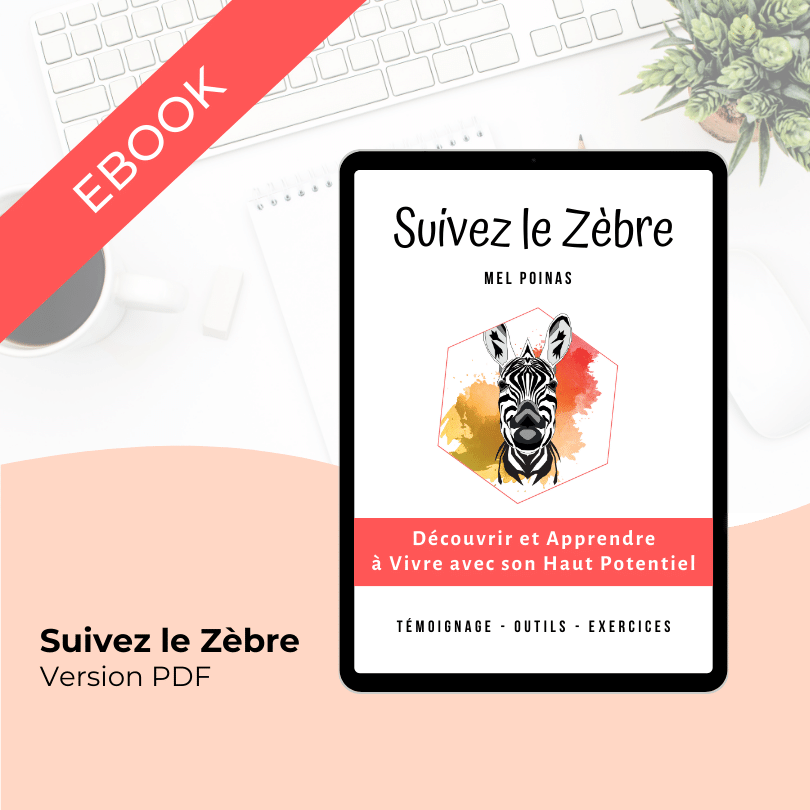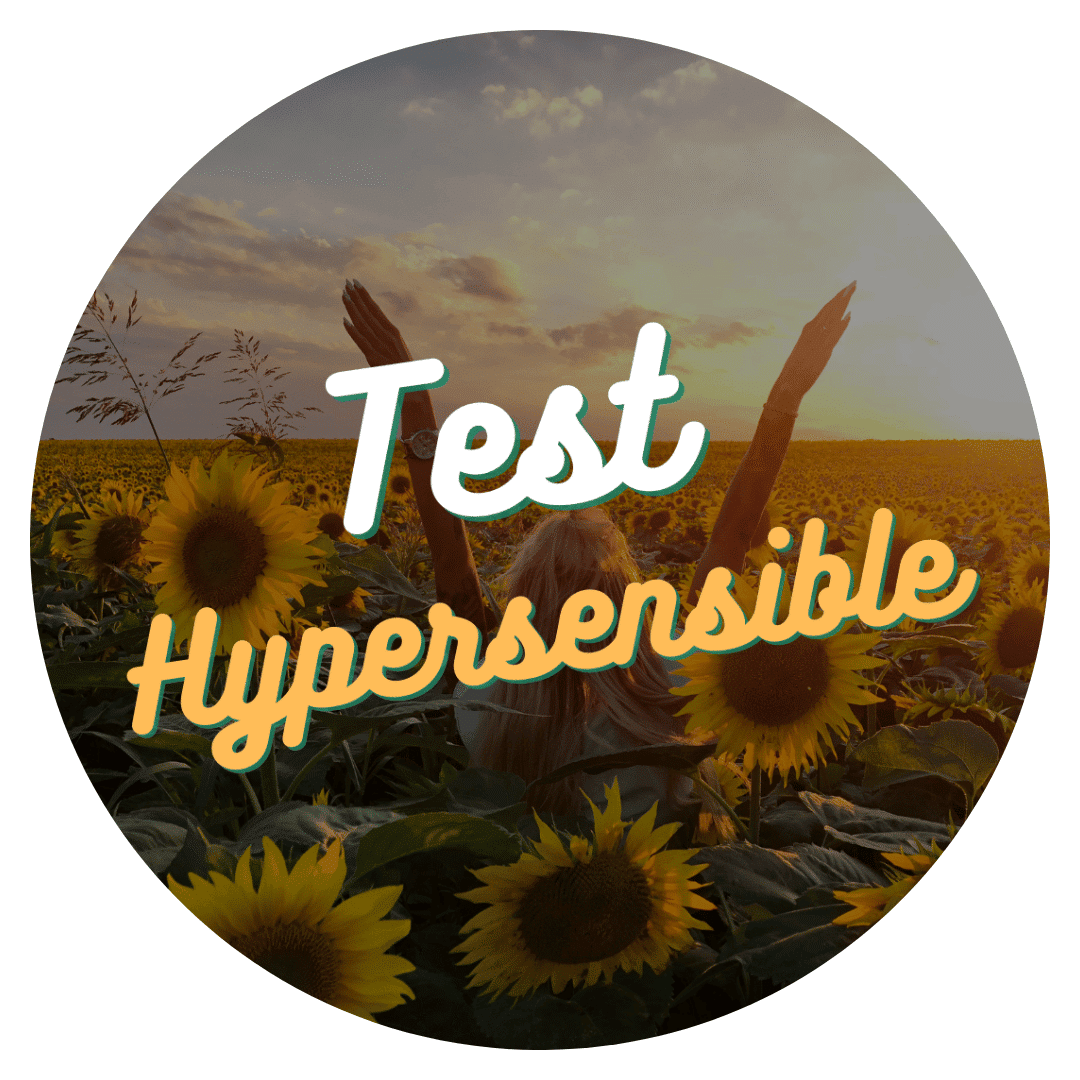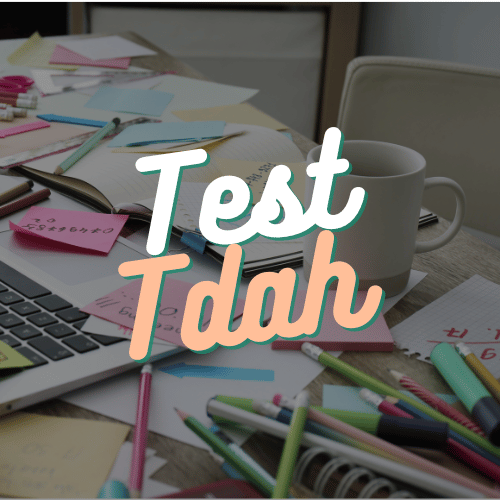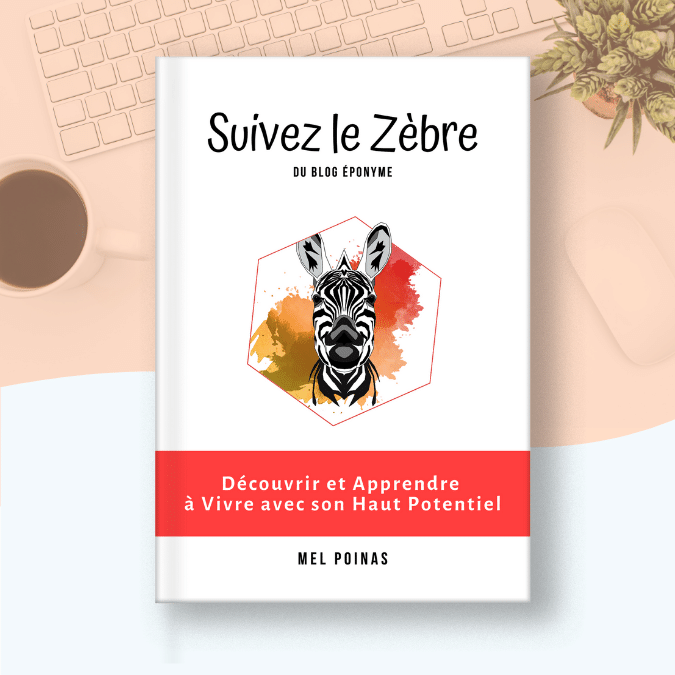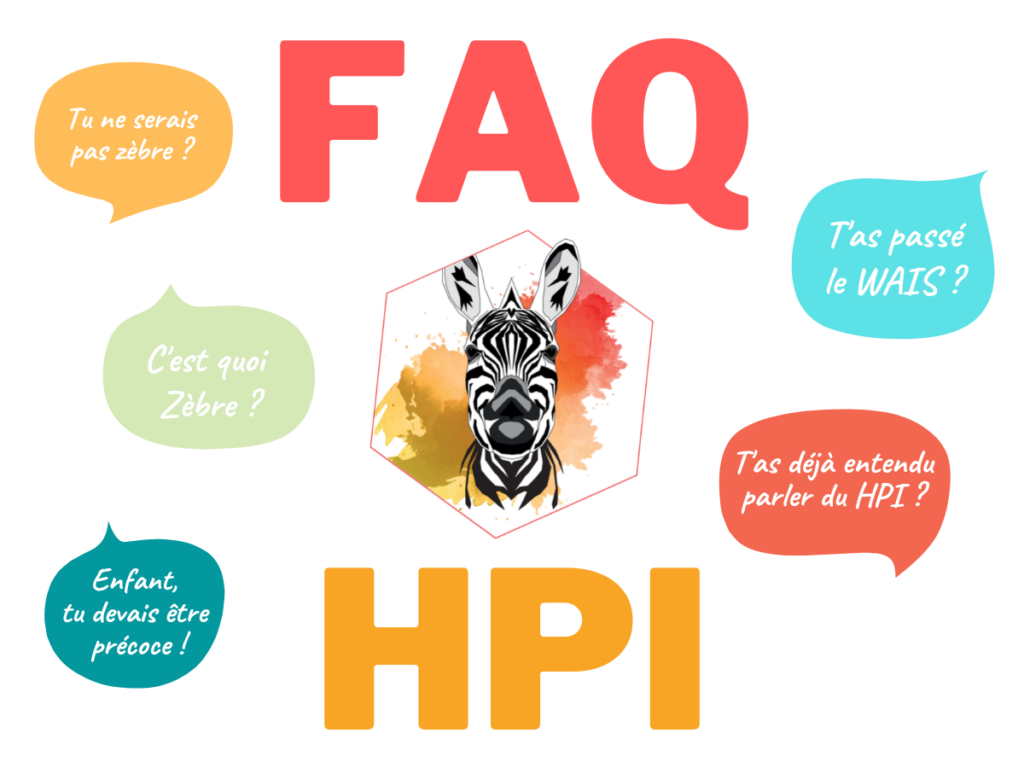Welcome to the first website 100% dedicated to neurodiversity and HPI: High Intellectual Potential
Find out how HPI is defined in our FAQ, where we’ve listed all the questions you might have about this unique form of cognitive functioning.
At Suivez le Zèbre, we’ve been interested in HPI for over 5 years. Mel Poinas, the blog’s founder, was diagnosed gifted as an adult. She was 30 at the time. Following the discovery of her HPI, she decided to share her journey to democratize High Intellectual Potential.
Ready to find out more about HPI and answer the many questions you may have? Here we go!
What do the letters HPI stand for?
Definition of HPI HPI stands for High Intellectual Potential.
What makes an HPI profile special?
According to the current scientific consensus, an HPI person is one whose IQ (intelligence quotient) is two standard deviations above the norm. The IQ (intelligence quotient) of a person considered to be within the norm is between 90 and 110.
A person with high intellectual potential will have an IQ of over 130.
This IQ is measured between 0 and 160. In theory, according to the Gauss curve used to assess IQ via the Wechsler scale, an individual cannot have an IQ above 160.
If you’ve been watching the TF1 series HPI, Morgane Alvaro, played by Audrey Fleurot, has the maximum IQ identifiable via this test. Only a tiny percentage of people have such an IQ. Above an IQ of 145, the term “very high intelligence quotient “ is used (0.13% of the population and 0.0025% above an IQ of 150, equivalent to one individual in 5,000).
Don’t forget that behind IQ, there’s a human being. To fully understand HPI, support from a psychologist or neuropsychologist is essential.
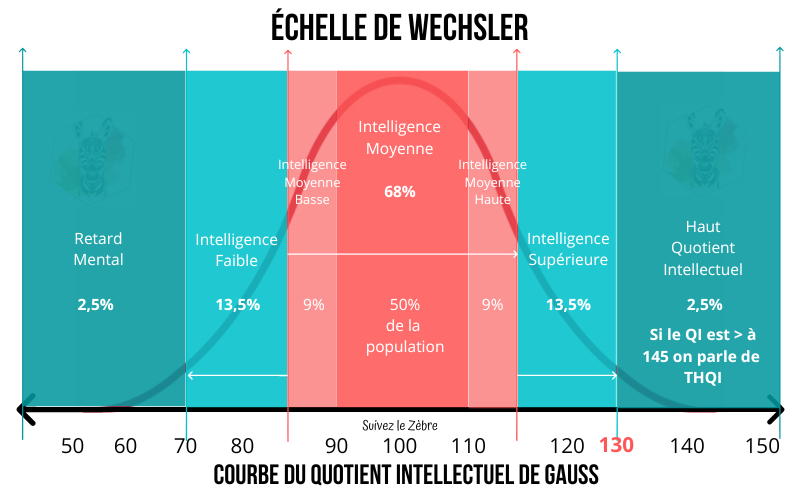
What are synonyms for the word HPI?
Synonyms for HPI(high intellectual potential) are as follows:
- gifted
- zebra
- surefficient
- philo-cognitive
- hyper-thinking
- intellectually precocious child
- giftedness
- intellectual precocity
When you read, hear or see one of these terms, it means exactly the same thing as being HPI.
Why zebra for HPI?
The zebra name for high-potential individuals comes from Jeanne Siaud-Facchin, clinical psychologist and specialist in HPI .
The zebra is the only equine that cannot be tamed. Then, even if at first glance the zebras all look identical with their black and white stripes, closer up you realize that their stripes are all different. They’re like fingerprints. Each zebra has its own coat.
A beautiful allegory to define these HPI profiles , thanks to a term that steers clear of clichés, unlike HPI and gifted, which are more overused.
If you’d like to know more about the term zebra, please read our full article: why zebra for HPI
And abroad, what do you call an HPI person?
In English, we use the term GIFTED to refer to HPI. It can be translated as gifted or gift. As a result, there’s less of this notion of being more gifted or higher than others. The definition is more neutral and will certainly arouse less misunderstanding or jealousy. In English-speaking countries, HPI is a non-topic. There’s little or no talk about it, and there’s no hyper-mediatization like in France.
Is high intellectual potential a disease?
No, HPI is neither an illness nor a personality disorder. It’s a singular cognitive function of the brain. We’re not talking about diagnosis, but detection oridentification. If some sites talk about the symptoms of HPI, that’s a mistake. We’re talking about characteristics, and even here, there’s no scientific consensus on the signs of HPI in an individual.
Beware, if you come across sites or blogs that talk about symptoms and diagnoses when talking about HPI, they are either mainstream media that don’t specialize in HPI, or opportunists surfing on the subject and the fad.
Scientifically, what is HPI?
A person identified as gifted has an IQ above 130 on the WAIS test (scale of 160). He is one of the 2 to 3% of the population to be in this range of 2 standards deviations above the French national average (90 to 110) on the Gaussian curve.
The WAIS test is administered by a psychologist or neuropsychologist specialised in Giftedness.
Neuroscientists and neuropsychologists agree that High Learning Potential (HP) can be detected from an IQ score of 130 on the Weschler Scale (WAIS test). In France, a person can be considered HP from an IQ of 125. However, while the IQ is an essential factor in identifying HP, the person’s history (anamnesis) and the exchanges with the psychologist on his cognitive abilities can complete the detection.
If we stick to the scientific consensus, to be gifted is: to have abilities clearly superior to the average of the population. Source: Psychologie du Haut Potentiel book, p37.
How many HPI people are there in France?
In France, HPI is intrinsically linked to IQ calculations. Today, according to scientific studies, between 2% and 3% (2.3% to be precise, i.e. 1 in 44 people) of French people are considered HPI, which corresponds to the threshold of the population with an IQ above 130.
As we use this single IQ metric through the WAIS in France, then the validation of a gifted person is based on this operational definition of High Potential.

2.3% of the French population is above 2 standard deviations from the norm. 4.8% are above 125; that is to say 1 person out of 21, these thresholds are arbitrary, without biological or cerebral justification . (p40)
On the other hand, cognitive abilities are multiple. Very high scores in some areas (high potential area) may be enough to cause a feeling of deviation from the norm. It should be noted that the presence of discrepancies between scores does not call into question the use of overall raw IQ to identify the presence of high potential at global level.
source : Psychologie du Haut Potentiel p44-46
To find out the exact number of people affected, a huge survey of the entire French population would have to be launched. One day, who knows?
Can we become HIP?
No genes have ever been found, but instead scientists rely on a multitude of on a multitude of genetic influences . If we start from IQ to identify an HPI and consider that IQ can vary except under particular environmental conditions (accident, illness, control…) throughout an individual’s life, then we cannot deny that we are born HPI. We would therefore be in the realm of the innate rather than the acquired.
However, it’s clear that an individual is a collection of intrinsic characteristics, and that environment and education play a major role in the development of his or her abilities. While IQ remains the most reliable metric for identifying an HPI via a test, taking into account a more global context remains essential for assessing the uniqueness of a profile.
What are the characteristics of HPI?
If we take a purely scientific approach, the characteristics of HPI profiles simply correspond to having abilities well above the population average.
Obviously, this is too vague a definition. Especially when you’re talking to the general public and to people who have questions, doubts and are looking for concrete answers!
How do you know if you have above-average abilities? How to take courage and dare to push the door of a psychologist without having a minimum of information or reassurance before?
This is one of the limitations of the literature and scientific consensus on HPI: they don’t take into account the human dimension of the quest for identity of individuals affected by a neuroatypia such as HPI.
That’s what prompted me to create Suivez le Zèbre in 2017. When I heard about gifted people, I couldn’t identify with them because I didn’t think I had superior cognitive abilities. On the contrary… I had trouble finding my place!
For the past 6 years, we’ve been tracking profiles on our blog that are looking for answers to the same problem: why I can’t find my place and feel “like everyone else”.
That’s where our work comes in. Today, in France, no one dares to stick their necks out because everyone hides behind this scientific consensus.
For our part, we’ve observed a number of common characteristics (not validated by scientific consensus) in our many exchanges with readers and professionals alike.
We also assume that people who come to our site are looking for answers. Perhaps the gifted people who don’t question themselves don’t have these characteristics at all! But our site is not for them. Our mission as a medium is to provide guidance to those who need it.
From our experience, here are the signs or personality characteristics identified by Follow the Zebra in its HPI readers:
1- an IQ very close to (125) or higher than 130 (on the WAIS test)
2- the need to be stimulated
3- great sensitivity which can sometimes turn into emotionalism when there are difficulties in managing emotions
4- the exacerbated quest for meaning
5- a desire for absolute justice
6- a hyper awareness of its environment
7- fear of rejection
8- A tendency to over-adapt in order to please or to be accepted but which often leads in the long term to exhaustion or a depreciation of one’s image and thus to an identity crisis
8- fast and divergent thinking (tree thinking has never been scientifically proven). The ability to make connections is one of the strengths of high potential people
9- Resilience, a capacity to adapt very quickly
10- a hyper awareness of its environment and an increased resonance with others (humans, animals, nature)
11- intolerance to stupidity, disrespect, stupidity and mediocrity
12- a problem with authority (especially when it is considered illegitimate)
13- a vision of a world where all individuals and living things are interconnected
14- a great capacity to question, to doubt, to change point of view and to adapt
15- sometimes the ability to synesthetize (not the case for all gifted people)
16- for some, hyperesthesia
17- in general, a brain that works at full speed and rarely takes a vacation!
Is HPI genetic?
The brains of HPI profiles are full of surprises and peculiarities. Discoveries about how this works are still very recent! Just over a century. Neuropsychologists can’t say for sure, and new studies are underway.
At Suivez le zèbre, we’re neither psychologists nor neuropsychologists, but we can’t wait for psychologists to demonstrate the link between heredity and genetics in HPI because we’re pretty convinced that’s the case!
In general, when an HPI is identified in a family, others follow: grandparents, parents, siblings, uncles, aunts, cousins…
What if I want to know if I’m HPI?
In France, there’s currently only one way to be detected as an HPI when you’re an adult, and that’s to take a test called the WAIS via a psychologist or neuropsychologist specializing in neurodiversity and, in particular, high intellectual potential.
For children, from the age of 6 until the eve of their 17th birthday, we take the equivalent of the WAIS, a test called the WISC.
What is WAIS?
The WAIS 4 test, which comes from the English Wechsler Adult Intelligence Scale, is a psychometric test that measures an individual’s intelligence quotient and detects a possible HPI .
At the end of the test, an overall raw IQ is calculated. The psychologist analyzes the history and the IQ test to determine if he is HPI. Below 130 on the IQ test, some psychologists do not validate HPI, but speak of HPI functioning. Anamnesis and heterogeneous results confirm the hypothesis of High Potential.
If you’d like to find out more, please read our full article: the WAIS test
How does the WAIS test work?
The test consists of three main stages. The specialized psychologist will first analyze the patient’s history. The anamnesis is a retrospective of the person’s history. If the psychologist detects a particular way of functioning, he or she will suggest taking the test. Then, after the assessment, he returns the psychological assessment in the form of a booklet.
The test consists ofaround ten exercises and lasts between 1h30 and 2h. To sum up, the test is :
- An initial one-hour interview
- The WAIS test, two hours
- Test correction by your psychologist
- One-hour face-to-face WAIS debriefing interview
- Delivery of the booklet containing the complete Assessment and the results of your tests and subtests
Where and with whom to take the WAIS test?
If you’d like to take the WAIS test under the best possible conditions with a psychologist tested, validated and approved by the readers of Suivez le Zèbre, visit our directory of psychologists and neuropsychologists specializing in HPI.
How much does it cost to take the WAIS?
HPI tests are expensive. The WAIS test costs between 350 and 500 euros, depending on the region.
How much does it cost to take the WISC test?
Like the WAIS, the WISC test costs between 300 and 500 euros.
Are online IQ tests reliable?
At Suivez le Zèbre , we don’t recommend taking any paid online tests that promise to assess your IQ (in 20 questions ^^).
HPI cannot be detected and assessed via an internet test. Only a psychologist or neuropsychologist can detect an HPI profile.
However, tests are offered on Follow the Zebra. Yes. They cost 1 euro, put you on the right track, but are in no way tests certifying neuroatypia or anything else. They are a first step in the quest for identity.
Are there any other tests that can detect HPI?
In France, only the WAIS is used, and it is the ONLY viable and valid test for identifying an HPI . Psychoanalysts and coaches are not trained or qualified to identify HPI profiles.
You’ll find other forms of testing, such as the MaryRocamora test. Like the HPI test on Suivez le Zèbre, these are pre-tests for reassurance, but they are not sufficient to determine an HPI .
What if the test does not identify me as HPI?
If the WAIS test doesn’t live up to your expectations, that’s okay. From now on, you’ll have more knowledge and precision about how you work.
The test is not there to label or categorize individuals, but to help us gain a better understanding of ourselves.
If the psychologist is competent, you will leave the office with a psychological report detailing the various indicators, your results and the psychologist’s analysis. You’ll know where to focus your quest for identity.
Is the test compulsory?
No, not at all. Testing is not an end in itself. If you don’t want to spend it, no problem. Some people don’t feel the need to take it, because they don’t need to be validated. Knowing or not knowing that they have HPI makes no difference to their daily lives.
Sometimes, we just don’t feel ready and need a little more time to decide. Fear of failure can be a major obstacle. Trust yourself! And beware of self-detection, which can sometimes drift into a sectarian posture or discourse that discredits the notion of HPI.
Can you be HPI and Hypersensitive?
Here again, there is no consensus in the neuroscientific community. Officially: no!
As in the case of heredity and genetics, in the case of Follow the Zebra, experience has shown that those who ask themselves a lot of questions also possess this emotional capacity to feel everything very intensely.
We certainly have the readers we deserve! At Suivez le zèbre, we think there’s a correlation between HPI and hypersensitivity (high sensitivity, sensitivity observatory), but we’re not psychologists and we can’t prove it. Now we’re waiting for the scientists to prove it 😉
Can we distinguish between HPI and HPE?
HPE would be a high emotional potential, i.e. a person’s ability to manage his or her own emotions and identify those of others. For HPE, no consensus. Scientifically, the notion of HPE does not exist and has not been proven. It was created by Raymonde Hazan, a French psychoanalyst, in a YouTube video. At Suivez le Zèbre, we 100% agree with the neuroscientists that HPE doesn’t exist, and even tends to add confusion instead of helping with the quest for identity.
HPE is confused with Emotional Quotient, a concept developed by psychologist Daniel Goleman in 1995 in his best-selling book Emotional Intelligence.
Why the confusion between Emotional Quotient (Goleman’s concept) and HPE?
Quite simply because Goleman, supported by his marketing team, entitled his book Emotional Intelligence. When we talk about HPI, one of the first notions that comes to mind is intelligence. An HPI person would be more intelligent than a normal person because he or she has a higher IQ, as we saw earlier.
Higher IQ = HPI and therefore, by shortcut, higher EQ = HPE
Except that unlike IQ and HPI, which are innate, EQ is acquired. By working on yourself, you can develop and cultivate your EQ.
Beware: many ill-intentioned (or misinformed) psychologists or health professionals are surfing on this notion of HPE by giving paid tests on it or coaching potential HPEs.
As much as for the HPI, in the search for understanding of one’s own functioning, it makes sense to take the WAIS, especially when you feel out of step and want answers. On the other hand, EQ tests are mainly used by recruiters in companies and business schools! Why? Because some jobs require a perfect mastery of emotions, good empathy, self-confidence and the ability to relate to others.
What are the (supposed) characteristics of HPE profiles?
When we take a closer look at the various sites that reference these characteristics, we see a clever mix of signs and characteristics generally attributed to HPI and hypersensitivity profiles.
You won’t find any tools or articles on Follow the Zebra to help and support the HPE.
However, if you find yourself in this concept, we’d advise you to look for either emotional hypersensitivity or HPI, but above all, help us to do away with this confusing term, which does nothing to facilitate the democratization of HPI and feeds misdiagnosis.
Is being HPI a disadvantage or an advantage?
Neither one nor the other! Being HPI is a function, not an identity, not a social status, not a guarantee of happiness or unhappiness, but it is an adventure, that of the quest for identity! And, HPI or not, we’re all faced with it.
What books can I read if I’m interested in HPI?
If you’d like to find out more, welcome to the zebra’s library!
We’ve got scientific books, personal accounts, comics, pedagogy and a wide variety of concepts!

You can also find more information, resources and tools on Giftedness in Mel POINAS‘ book. With a lot of humor, Mel tells the story of the discovery of her giftedness and the routines she put in place to finally find her place!

Le livre
Écrit par une HPI !
Un témoignage et des solutions concrètes pour découvrir, comprendre et apprendre à vivre en étant HPI.



How do I deal with the people around me?
We may sometimes feel misunderstood by others, but that’s okay. The most important thing is to feel good about yourself <3.
If you like our work and want to support our tribe, you can share our content to give us visibility, buy one of Mel Poinas’s books (which entirely finances the blog), do one of our tests or just leave us a little comment that will make us super happy!
Thank you very much ❤️
Suivez le Zèbre’s tribe

